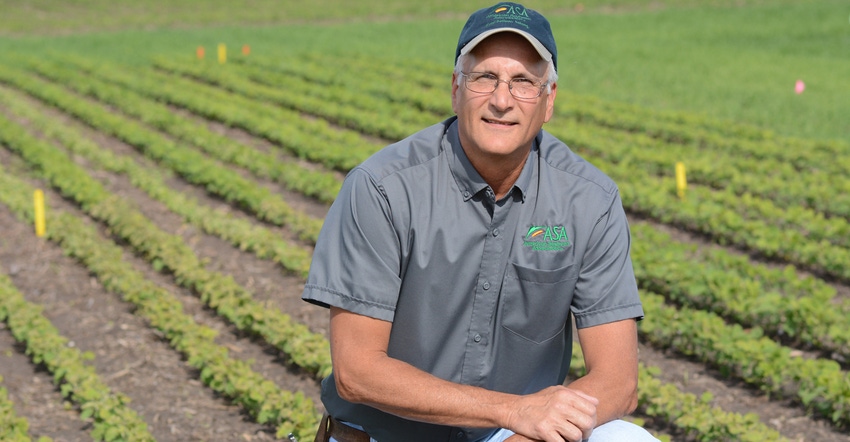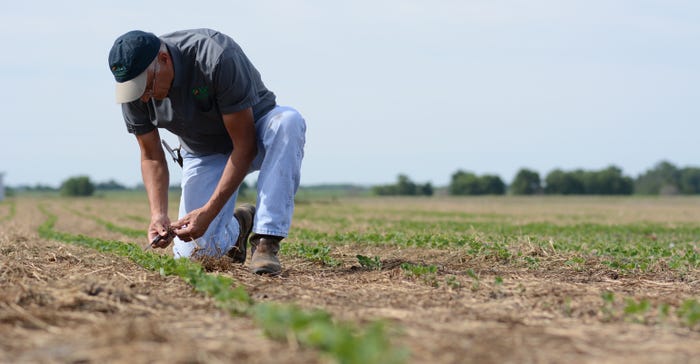
When Ron Moore came home to farm in 1977, he never imagined he’d wind up president of the American Soybean Association. In fact, the only organization he’d ever presided over at that point was his college fraternity. And yet, today the Roseville farmer represents soybean farmers from across the country, leads an organization dedicated to their betterment, works with staff and corporations and politicians, and even more: He really enjoys it.
Moore and his wife, Debbie, farm a couple thousand acres of corn, soybeans and pasture in western Illinois, along with managing 220 head of cattle. She volunteers tirelessly, telling the farm story to urban families, and the couple now farms with one of their three sons, Mike. Moore is also a past president of the Illinois Soybean Association and Warren-Henderson County Farm Bureau.
In a conversation straight from his kitchen table, here’s a look at how Moore has influenced Illinois agriculture — and what he’s learned from it all.
Where did life start for you? This is the house I grew up in. I wanted to be an accountant when I went to college, and I went to Culver Stockton College to play football. It was fun in high school and the first couple years; then it became a chore. I had an athletic scholarship that was $300, and academic scholarship that was $1,500. I was borderline on losing the academic scholarship, so that was a basic economic lesson: Jeopardize the $1,500 to keep the $300? OK, that doesn’t really work.
Do you remember the conversation when you first decided to farm? I had no desire when I went to college to come back and farm; I wanted to be an accountant. I came home at Easter break my senior year, 1977. We were sitting around the table and I told my dad, I really don’t want to do what I thought I wanted to do. I want to come home and farm. He was nearing retirement age but not ready to retire yet. I had the blessing of being able to farm with him for five years. He would come out at harvest, drive his pickup to the combine, climb out and into the combine, harvest for an hour, climb back out and into his truck, drive back to town — just to show me he still could!
One of the things my father told me when I came home to farm was to give back to your community. Somebody was on the school board that helped build the school, somebody was on the church board, somebody was on the hospital board to make our community a better place to live. I started getting involved in different things, like our county Farm Bureau, local bank, local hospital board of directors, county zoning board of appeals. My father had done those kinds of things during his farming career, and he instilled the desire in me to volunteer to do what I can to improve the situation in agriculture.

SUSTAINABILITY: According to Ron Moore’s personal definition: “Increasing the production of food while preserving our natural resources, and making our communities a better place to live.”
What have you done as a farmer-leader that no one else could have? What were you able to bring to those positions? I make sure everybody is included in decisions. It’s easy to be an autocrat because that’s what we do on the farm. We’re masters of everything we do. We make all the decisions — which tractor to buy, when to buy land. But when you go into a commodity association board, you have to include as many people as possible when you make that decision. You learn in kindergarten how to work with other people. I’m not the smartest guy, but I’ve been able to bring people together and fight for a common goal.
How do you solve a problem? The first thing is to find out what the other side sees that I’m not seeing. Have a conversation: You think this, I think this; how do we come to a resolution for all parties concerned? Those are tough conversations to have with a fellow farmer. Ultimately our goal is the same: Promote soybeans or corn. But we have to figure out which way works the best.
What’s one thing you do that’s directly tied to your success? I read a lot. A lot of emails. When people send you information or questions, you have to respond. You have to show people you care about what they think and you care about the issues. I spend several hours every day, either at night or early morning, reading and responding. We get talking points from ASA, and if I don’t understand, I have to ask and self-educate so I don’t miss something.
What is it like to run for office? I lost more elections than I won. You have to take some losses before you can be the leader of the organization. That’s a humbling experience. Don’t let those defeats define you. Don’t let them make you bitter.
You’ve served on several boards and committees in your career. How do you build consensus? You can get more things done in the hallways or at dinner. You’ve gotta become friends with the people who don’t agree with you. You become friends by going out for dinner and talking about your family and my family and what your kids are doing and what you’re doing on your farm. If you’re friends with people, you’ll figure out how to make the right decision that benefits the most people. If you detest the person you’re working with, it’s really hard to come to any kind of agreement. That’s what you see in Springfield. They just don’t like each other. It’s counterproductive.
How have you known when it was time to make a change in your life? It’s one of those instinctive things. After I was county Farm Bureau president for four years, it felt like everybody was letting me do stuff they were capable of doing. As long as I was there, no one was going to step up. You have to know when it’s time to step back and let somebody else have that leadership role. I stayed on the zoning board for 35 years — stayed on because it was very complicated and laws are complex. After you’ve been on long enough, you feel like you’re the only one that knows the rules, and then it was time for me to step out because no one else was learning the rules.
You have to make room for somebody else to replace you. I’ve done my civic duty; time to let someone else do theirs.
What do you want your life to be about? I want people to think I did a good job farming, I was a good neighbor, and I cared about people beyond my county. I want to make sure they’re well taken care of and can flourish in their communities.
MOORE REFLECTS
• On sustainability:
“My personal definition: Increasing the production of food while preserving our natural resources, and making our communities a better place to live.”
• On family and volunteering:
“The stage of your life makes a difference on what you can and can’t do. I was involved in county organizations before my kids got old enough to be in 4-H and sports. When they got into high school, I got on the state soybean board. But I never went to the August meeting because it was the same time as the county fair!”
• On lessons for his sons:
“Have passion for what you do. If you want to be a ditch digger, be the best ditch digger you can be. Whatever you do, do it at the best of your ability.”
• On his bookshelf:
“I like crime mysteries! Michael Conley. I’m halfway through his series.”
• On serving in a national organization:
“Representing soybean farmers at the national level is very humbling. They’re they best people agriculture has to offer. I didn’t expect to enjoy this as much as I have.”
• On what he admires in friends:
“I admire their work ethic. I admire anyone who can go raise food for people and do it well and do it with compassion. And I admire the ability of people to reduce their ego and work together.”
MOORE IN BRIEF
Truck? Chevy
Tractor? Case IH
Livestock? Beef cattle
Team? Chicago Cubs
Place to be? Section 5, Roseville Township (home)
Technology? Cellphone (“blessing and curse”)
Book? “The DaVinci Code”
Hobby? Morning and evening route: check crops, check pastures, check cattle
Favorite conversation? I’d love to talk to my dad about agriculture and the things that have changed over the past 25 years.
Family? Wife, Debbie; sons, Steven, Mike and Brian
Best decision? Asking Debbie to marry me
Best advice? From my dad: Hurry up like it’s gonna be wet, but farm like it’s gonna be dry.
About the Author(s)
You May Also Like






